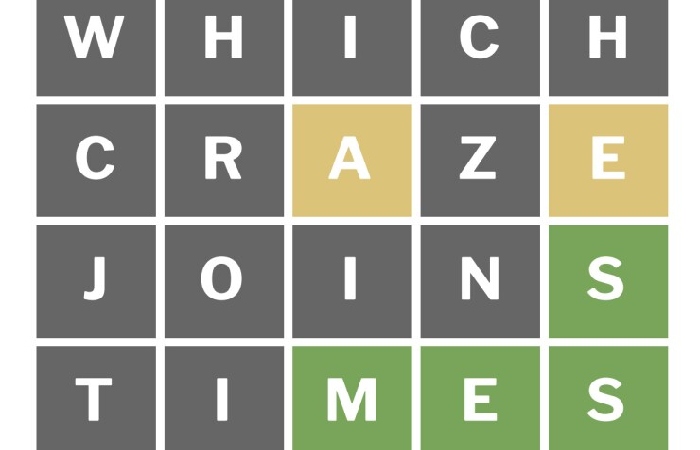Table of Contents
Introduction

Have you ever found yourself stuck in a rut? Then welcome to Life Saver One: www.nytimes.com/games/wordle/index.html; the word game is taking the internet by storm.
Whether you’re a follower of word games or not, www.nytimes.com/games/wordle/index.html is the perfect way to break up the monotony of daily life and challenge your brain, and it’s fun too. With a few clicks, you can start your journey to master one of the most popular word games.
In this definitive guide, we’ll show you what www.nytimes.com/games/wordle/index.html is all about and provide valuable tips for mastering it like a pro. So spring into action, and let’s get started.
What Is www.nytimes.com
Have you heard of www.nytimes.com/games/wordle/index.html? It’s the viral word game that’s taken the world by storm. With a simple, clean design and easy-to-understand rules, this game is a hit with people of all ages. And the best part? It’s completely free to play.
So, how do you play? At its core, www.nytimes.com/games/wordle/index.html is a wordsmithing game where you try to create as many words as possible from a grid of nine randomly selected letters. You score points for each word you find and bonus points if any of those words are five letters or longer. So, use your vocabulary and quick-thinking skills to create as many words as possible before the timer runs out and your score is
www.nytimes.com/games/wordle/index.html offers endless hours of fun for all ages, so be sure to check it out today.
How to Play Word Game
If you haven’t heard of www.nytimes.com/games/wordle/index.html, you’re missing out on the hottest word game to hit the internet. Here’s how it works:
- Choose your words: The game shows you a grid of random letters, and it’s your job to make as many words as possible. Remarks can end horizontally, vertically, or diagonally anywhere in the grid.
- Score points: Each word from 2-8 letters are worth its letter count in points, and 8+ letter words earn double points.
- Be strategic: You can use bonus squares to boost your score even higher or reveal extra letters that weren’t visible at first glance.
- Keep going.: When all the letters in the grid use up, and no new arguments can exist, it’s time to end the game and view your final score. Then, with some luck and skill, you can make your way into the leaderboard of top players.
With www.nytimes.com/games/wordle/index.html, wordplay just got a lot more fun. So get playing now. You won’t regret it.
Tips and Tricks for Solving It
Playing www.nytimes.com/games/wordle/index.html can be a fun challenge if you know the tips and tricks that can help you solve the puzzles more quickly.
Look for Common Prefixes
One of the most valuable strategies for solving puzzles is to look for common prefixes, such as. Many words use these prefixes, so by looking for them, you can narrow your search and save time when trying to find a solution.
Focus on Longer Words
Another great tip is to focus on the longer words in the puzzle, as they often contain multiple letters from which you can create other words. It can be beneficial when you are stuck on a level and must find a solution quickly.
Look at Word Patterns
When it comes to word games like www.nytimes.com/games/wordle/index.html, patterns are your friend. By observing how letters arrange in the puzzle, you can figure out which letter combinations will likely form viable words and make progress toward solving it faster.
With these tips in mind, you’ll be well on your way to mastering www.nytimes.com/games/wordle/indexe easily.
The History and Creation of www.nytimes.com
www.nytimes.com has become incredibly popular over the years, but where did it come from? It all started with a computer programmer named Jonathan Feinberg in 2007.
Feinberg had the idea of creating a word cloud generator. A data visualization tool that turns words into shapes. He was working at the time on a particular project at IBM. After creating it, he decided to make the tool public, and the result was Wordle. The addictive game you know and love today.
At first, people used Wordle to create word clouds for their projects and websites, ranging from art projects to blogs. But it wasn’t until February 2009, when The New York Times released its online version of Wordle, that things took off.
In its first month alone, the game had over 4 million plays. Since then, www.nytimes.com/games/wordle/index.html has been featured on popular sites like Wired and The Guardian, further solidifying its place in general culture as one of the most addictive word games.
Why It Became an Internet Sensation
So why has www.nytimes.com/games/wordle/index.html taken the internet by storm? It combines robust game design, an accessible interface, and massive appeal to players of all ages.
Unique Gameplay
The rules are simple and easy to know, requiring players to form words with the tiles on the screen to score points. What makes it stand out is that it rewards creativity. Instead of finding words, the best players look for clever combinations that produce more significant scores.
Sleek Interface
The game is straightforward to pick up and play without instructions or tutorials, making it great for kids and grandparents. The interface has clear buttons, bright colors, and an inviting atmosphere that draws you in without making it seem too complicated or daunting.
Mass Appeal
www.nytimes.com/games/wordle/index.html has something for everybody. Whether you want to kill time or challenge yourself to find obscure words for the highest score, this game has something for you. Its appearance on popular websites and social networks helped catapult its success as a viral sensation today.
Other Word Games Similar To This
You’re in luck if you’re looking for something similar to www.nytimes.com/games/wordle/index.html. There are plenty of other word games like it. Here are a few you might want to check out:
Word Search
Word Search is a classic puzzle game that involves finding words in a grid of letters. It’s a great way to expand your vocabulary and keep your mind sharp with its interactive puzzles.
Word Snakes
Word Snakes aims to find as many words as possible on the board by connecting them with ‘snake’ lines. To play, choose a letter and combine it with other notes to create dishes using the same line. This game is excellent for anyone who wants to improve their spelling and sharpen their thinking skills.
Word Jumble
Word Jumble features scrambled letter combinations that must be well-organized to create valid words. It’s entertaining to practice spelling and get your brain working simultaneously.
Word games are an entertaining and educational way to pass the time, and there are dozens of variations similar to www.nytimes.com/games/wordle/index.html out there, so why not try them all?
Conclusion
Wordle has become a global sensation; it’s here to stay by the looks. With its addictive nature and ability to help you unblock creative thinking, it’s no wonder why it’s become such a hit.
Whether playing the game solo or with friends, It allows you to think outside the box and be silly without worrying about a right or wrong answer. You may be surprised by what words you come up with or even how creative you can get.
Wordle encourages us to play and have fun. What’s better than that? So grab your favorite device, head over to www.nytimes.com/games/wordle/index.html and try it.
Related posts
Featured Posts
What is Shiba Inu Coin? – Price, buy, and More
Shiba Inu coin launched in August of 2020, but it only recently enjoys enormous growth. And some crypto fans expected…
Watch and Download C/o Kancharapalem (2018)
C/o kancharapalem Movie Download C/o Kancharapalem is the 2018 Telugu-language slice of life anthology film written and directed by debutant…



